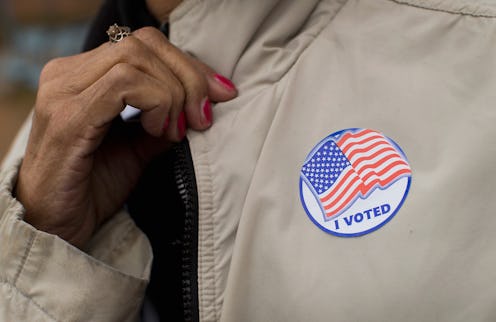
On Tuesday, the city of Boston is holding a hearing to discuss making its local elections more inclusive for the people who actually live there. Per the request of Council President Andrea Campbell, Boston officials will consider letting non-U.S. citizens vote in municipal elections.
"The purpose of our local government, including the Mayor’s Office of Immigrant Advancement, is to strengthen the ability of diverse, cultural, and linguistic communities to play an active role in the economic, civic, social and cultural life of the City of Boston," said the order Campbell issued earlier this year, according to ABC affiliate WCVB.
The idea, if codified, would potentially give voting rights to legal permanent residents, visa holders, those with temporary protected status, and/or deferred action for childhood arrivals (DACA) recipients. If Boston were to expand voting eligibility to non-citizens, it would not be the first place in the United States to do so.
Several municipalities in Maryland allow non-citizens to vote in some capacity. Most recently, Hyattsville, Maryland extended the opportunity via an amendment to the city's charter. According to The Washington Post, non-citizens are not allowed to vote in country, state, or national elections, nor can they run for office. They can, however, cast ballots for positions held within their municipality. San Francisco also allows non-citizens to vote in school board elections so long as they have a child who attends the city's schools.
To be clear, the city is not considering letting undocumented immigrants vote. Rather, those who could potentially become eligible would have to be non-citizens who legally live in the city.
Citing a 2015 American Community Survey of the U.S. Census Bureau, Campbell's order for a hearing said that 190,123 "foreign born residents" resided in Boston. That comes out to just over 28 percent of the city's population.
The order also referenced Boston Planning and Development Agency's "Boston by the Numbers" 2015 report, which, according to the order, concluded that non-citizens generate more than $3.4 billion in expenditures, $2.3 billion to the region's gross product, and paid $116 million in state and local taxes.
Boston's hearing comes as immigration law has evolved into one of the most contentious political topics of the year. President Trump has repeatedly attempted to tighten U.S. borders, implementing sudden and dramatic limits on who is allowed to enter the country, and handing down severe punishments for those accused of illegally entering. His orders have, at times, resulted in massive, impromptu protests nationwide.
Choosing to even discuss allowing non-citizens to vote in local elections directly conflicts with the current administration's rhetoric and policy decisions regarding immigration, and is likely to prove divisive. However, the idea is still in its very early stages. As Campbell underscored on Twitter on Monday, the hearing is simply a discussion — not a legally binding vote.
"Tomorrow is just a conversation, not a vote on an ordinance," she wrote. "I can no longer only go to rallies or send resolutions to Trump; what can we DO at the local level to support our immigrants? The discussion will include voting & OTHER possibilities."
Reaction on Twitter was mixed, but many critics were quick to share their opinions on the platform. However, because the idea is in the early stages, where discussion is key, it's unclear whether those negative responses will ultimately reflect how the Boston public feels as a whole, or how they are likely to feel once both sides share their opinions on the matter.
As Campbell said in her Monday night tweet, the potential suffrage expansion won't be the only idea brought forward insofar as expanding inclusivity is concerned. But if the last several month's news cycles are any indication, it's likely catch a lot of people's attention.